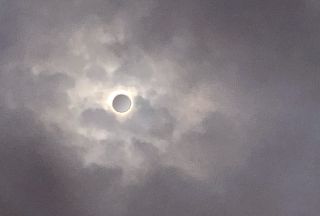Magical Thinking
Superstition Along the Path of Totality
The rational vs. the empirical.
Posted April 12, 2024 Reviewed by Hara Estroff Marano
Key points
- The recent eclipse awed more than a hundred million.
- Catastrophists didn't miss the opportunity to instill fear.
- Junk premises entail junk conclusions.
The total eclipse of the sun has come and gone. This time around, the shadow barreled through the vicinities of about 180 million exhilarated Americans. As the moon obscured the star’s brilliance during a brief interval of totality, the sun’s atmosphere, its spectacular corona, shimmered and pulsated. Stars punctuated the momentary darkness at noon.
As we watched the phenomenon slide behind clouds and then emerge again, we heard (and joined) the delighted whoops and hollers that echoed around the neighborhood. This riveting spectacle awed us and connected us.
Eclipses, in their spectacular glory, have for millennia understandably sustained imaginative folktales and sparked religious fear and fervor. Storytellers frightened or intrigued their listeners who had gathered around flickering firelight with tales of dragons, jaguars, snakes, or other sky creatures poised to devour our local star. These compelling tales once sufficed as explanation.
"So Much for the Apocalypse"

As neighbors gathered in our driveway to witness the celestial show this time, a small procession equipped with electronic megaphones passed by. They interrupted the event with a message of loud and awful warning. The Second Coming, in the twilight’s sudden chill, was imminent. I’ll note for the record that this messianic prophecy, like countless others, went unfulfilled. The world didn’t come to an end. Neither did the Norse god Loki turn a pack of space wolves loose to gnaw at the moon.
The fearful cries of conspiracy theorists and other professional alarmists who haunt the internet also failed to transpire. Pregnant women did not suffer ill effects. The power grid held steady. A second bloody Civil War did not ignite. As the executive editor of The Atlantic put it, “so much for the apocalypse.”
We can be either reassured or continue to be dismayed. The world, it turns out, is no more and no less catastrophic than it was the moments before or after darkness overtook us.
Summoning Fear
National media figures, however, amplified the nearby fearful voices. When one of the noisier (and flakier) congresswomen weighed in to mark this week’s geological and celestial events (two earthquakes had rumbled my region in the last few days), she sounded an apocalyptic note: “God is sending America strong signs to tell us to repent.” For her, natural events resonated with unspecified, evil portent. But more to the point, let me suggest, they attracted the attention of fearful constituents whose fear she meant to exploit.
Parsing Prophecy
Genuine or cynical (and who could tell which?), the congresswoman’s alarming prophecy raises several basic questions:
In the first place, why would an almighty deity need to deliver a coy message from geology and astronomy when the means of social media would do to spread a warning?
Shouldn’t omnipotence also make telepathy available for direct notification?
Also, who is supposed to be warned or, for that matter, punished when natural disaster indiscriminately strikes down both the righteous and the sinful?
Another equally obvious question: Which earthquake, specifically, should be the object of fear and the agent of retribution?
Spoiler alert: seismographs around this geologically active globe dependably detect an average of 20,000 temblors per year, each year.
And as for the total eclipse of the sun, well, the event is neither rare, random, mysterious, nor unpredictable. Every year and a half or so, the moon will move predictably in front of the sun in such a way that it casts an earthly shadow that is dark in the middle and tenebrous at the fringes. Because the sun is 400 times larger than the moon and the moon is 400 times closer, the edges of the two celestial bodies match up, and we earthlings see the moon’s jagged profile.
Scientist vs. Witch Doctor
You won’t need a wizard to prognosticate the path of darkness of any eclipse. Astrophysicists who understand the gravitational interactions of planetary systems can accurately calculate when and where eclipses will appear a few thousand years into the future. (Thereafter, randomness interferes with prediction.) Scientists predict. Witch doctors foretell.
And here’s the difference. Our clever and sophisticated ancestors in Mesopotamia, the Babylonians and Assyrians, closely observed the night sky. This brilliant, nightly show encouraged myth makers in the free play of the imagination,. Myth soon settled into orthodoxy. Thus, even Greek astronomers risked the charge of impiety. In any case, the majestic view invited close tracking. Knowing where celestial bodies headed allowed star-gazers to know where they would intersect.
But what the ancients made of this striking foreknowledge is entirely different from the conclusions that experimentation affords. For the ancients, the movement of the stars and planets enabled predictions of human behavior, the fortunes or misfortunes of individuals, the success or failure of harvests, the outcomes of conflicts. On these unverifiable prognostications the fate of nations hung in the balance. So did the fortunes of the prognosticators themselves—an incentive to keep prophecies vague.
Rationalism vs. Empiricism
Astrology survives mostly as a game now. We chuckle over the Ouija board and similarly hold our breath during the weekly lottery draw. (Wish hard enough and you’ll hit the number!)
Critics call those others who are dead serious about this kind of fortune-telling and finger-crossing “irrational.” But this is entirely wrong.
Astrologers proceed from premises in meticulous if-then reasoning. Because the moon is rising into Taurus, this morning’s horoscope notes, I should “lean into [my] spirituality.”
No one can fault the logic here; it is just that the premises are junk. If one accepts a faulty premise, then just about any claim that logically follows can seem reasonable. Any wild intuition can be reasoned as truth. Garbage in, garbage out.
Carl Sagan, the astronomer and planetary scientist, called science a “candle in the dark.” Let him have the rousing last word of advice about rationalism vs. empiricism:
“You can go to the witch doctor to lift the spell that causes your pernicious anemia, or you can take vitamin B 12. If you want to save your child from polio, you can pray or you can inoculate. If you’re interested in the sex of your unborn child, you can consult plumb-bob danglers all you want… but they’ll be right, on average, only one time in two.”
References
Adrienne LaFrance, “So Much for the Apocalypse.” The Atlantic (April 8, 2024); Jeffrey Kugler, “Carl Sagan’s Widow, Ann Druyan, on the Mythic Biblical Power of a Solar Eclipse,” Time (August 15, 2017); Carl Sagan, The Demon-Haunted World: Science as a Candle in the Dark (1997).
Thomas L. Heath, Greek Astronomy (1991); T.E. Rihll, Greek Science (1999).




